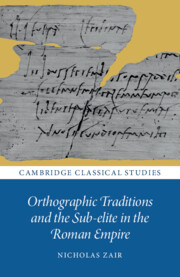The word populus goes back to *poplos, and the unepenthesised form is still attested in inscriptions from the fifth to the early second century BC; populus is first seen in inscriptions dating from the second half of the second century BC (Reference SenSen 2015: 149–51). The word pūblicus ‘public’ and names such as Pūblius ultimately go back to derived forms like *poplikos, *poplii̯os etc. At some point the first vowel became /uː/ and the second *p became /b/. It is commonly supposed that this was due to contamination with pūbēs ‘manpower, adult population’, but a sound change is not ruled out. Both changes had taken place by the start of the second century BC on the basis of inscriptional evidence like Publio(s) (Reference MarengoMarengo 2004: 169–70 no. 17: third or start of the second century), Poublilia (CIL 12.42), poublicom (CIL 12.402), poublic[om] (CIL 12.403), and long scansion of the first vowel in Plautus. On all this, see Reference SenSen (2015: 142–6, 151–2).
In the imperial period, the old spelling with <o> and <p> appears in names in Poplicola, Poplic̣ọla (TPSulp. 48) for Pūblicola, and with <o> but <b> in Poblici(us) (Kropp1.7.4/1, Cremona, early first century AD) for Pūblicius, Poblicola (TPSulp. 3, 77), Po[b]ḷịco[l]ạ (TPSulp. 32) for Pūblicola and Poblicius (TPSulp. 98) for Pūblicius. I have not done a thorough collection of examples in the corpora, since this spelling probably has more to do with the choices of the bearer of the name than the writer (assuming that those with this name adopted a spelling pronunciation).
However, there are also forms which are spelt with <u> but <p> rather than <b> . Whether pūblicus etc. is explained analogically, or by voicing of *p to /b/ followed by ‘breaking’ of *o to /ou/ > /uː/ as Sen supposes, there can never have been a form in which the *o had developed to /u(ː)/ but *p had not become /b/. So these forms must reflect not only old-fashioned spelling but artificial spelling. Again, in names such as Puplianus (P. Dura 100.xvii.13), I do not think that this tells us much about the education of the writer.Footnote 1
One writer, however, uses the spelling with <u> and <p> outside an onomastic context. C. Novius Eunus has puplicis for pūblicīs (TPSulp. 51, 52). The standard form is found in the part of the tablet written by a scribe, and also in both hands of one other tablet. Prior to its appearance in Eunus’ tablets this spelling only appears in the legal text CIL 12.583 (123–122 BC, Reference CrawfordCrawford 1996 no. 1), where it is presumably a false archaism felt to be appropriate for the legal register (the same text also has poplic- and poblic-). The old-fashioned nature of puplicis is highlighted by the fact that neither poplicus nor publicus are attested even in legal texts after the end of the second century BC (Reference DecorteDecorte 2015: 168–9). The spelling puplic- is attested in a handful of inscriptions later (or possibly later) than the tablets of Eunus: CIL 8.1280 (no date), CIL 14.3530 (AD 88), CIL 6.2097 (AD 61–180, EDR020711), puplico(rum) (ILA 492, AD 412–414).Footnote 2

